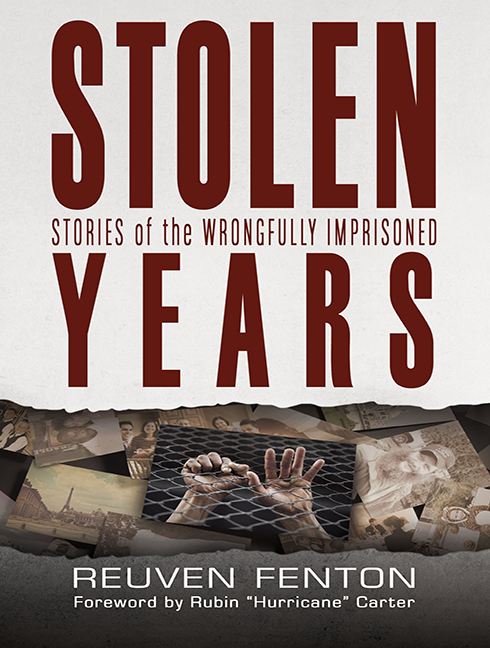Q & A with Reuven Fenton, Author of New Collection of Exoneree Profiles
11.10.15
In
Stolen Years: Stories of the Wrongfully Imprisoned
, journalist Reuven Fenton profiles 10 individuals who were wrongfully convicted and exonerated, including Innocence Project clients
Damon Thibodeaux
and
Cornelius Dupree
. The title was released Tuesday by Tantor Media. Ariana Costakes, writer for the “Innocence Blog,” spoke with Fenton about his new book, wrongful convictions and criminal justice reform.
IP: What inspired you to write this book?
RF:
As a breaking news reporter, I cover an unbelievably wide array of stories—so wide that whenever someone asks me what kind of news I cover, I have a really tough time explaining it. Sometimes I just say, “Murder and mayhem.”
Anyway, in recent years I started noticing that a story that popped up over and over was the exoneration story. This is where a wrongfully convicted man or woman is freed by a judge, and it’s a very emotional event. It’s something everyone should witness. There’s lots of crying and hugging and it’s really incredibly moving.
A couple years ago, I covered a particularly high-profile exoneration of a man named David Ranta, who had gone to prison for killing a rabbi in Brooklyn two decades earlier. Tons of press was there to cover it. After the court hearing, reporters were asking Ranta all these questions: “What’s your first meal going to be as a free man?” “What are your plans for the future?” Stuff like that. And that’s when I realized that there’s no way the breaking news format will ever get close to telling the story of what it’s like to spend two decades in prison for a crime you didn’t commit. That was the seed of an idea that eventually became
Stolen Years
.
IP: You interviewed exonerees from all over the country. What would you say was the biggest contributing factor in their wrongful convictions?
RF:
Misconduct by police or prosecutors had a role in the convictions of 47 percent of the 1,700 people listed on the National Registry of Exonerations, as well as nearly all the exonerees profiled in this book.
One of the exonerees I profiled, Devon Ayers, was wrongfully convicted as a teenager of murdering a Federal Express employee and a livery cab driver in the Bronx. He was a classic victim of unfair and overly aggressive law enforcement practices. Ayers might not have done 18 years in prison had police turned over a crucial surveillance video that discredited one of the key witnesses. While researching his case, Ayers’s legal team discovered that police had also fed crime scene details to two drug-addicted witnesses to help them “recollect” what they’d seen.
IP: If a reader was going to read one of the profiles in the book, which one would you recommend first?
RF:
That’s a tough one. Friends and family who have critiqued the book for me have all given different answers as to what their favorite profile was.
For practical purposes, I would probably recommend Cornelius Dupree’s chapter. For one thing, he spent more time in prison than anyone else in the book: 31 years. His story would be what I consider the “classic” wrongful conviction story. He and his friend were walking to a party one night in 1979 when the two were stopped and frisked by police officers looking for suspects in a robbery-rape case. Dupree and his friend were arrested, falsely identified as the perpetrators, charged, jailed, tried, convicted and finally sentenced to 60 years in prison. His life was stolen from his so quickly and he did so many years behind bars, that you can’t read it without being moved.
What makes Dupree’s story particularly amazing for me was that he was given a chance to get paroled early, provided he enrolled in a sex offender class. He refused, because he never committed a sex crime. He spent another six years in prison.
Cornelius is very soft spoken. He’s a very religious man and has an amazing outlook on life. He really inspired me.
IP: What would you like your readers to take away from this book?
RF:
I want them to be outraged. It’s inconceivable that so many thousands of people are behind bars right now, despite being innocent of the crimes they were convicted of. It’s a fate worse than death. And most of them will probably never get out because there are so many obstacles standing between inmates and their freedom. That’s why only 1,700 people have been exonerated since 1989—a tiny fraction of the wrongfully convicted.
IP: What can the average person do to prevent these types of wrongful convictions?
RF:
Make a hell of a lot of noise. If the stories in my book make readers angry, that’s a good thing. I want them to take those feelings and express them to the Powers That Be.
* * *
Reuven Fenton is a graduate of Columbia University Graduate School of Journalism and has reported for the
New York Post
since 2007. Follow him on Twitter
@
ReuvenFen
You can purchase
Stolen Years
on Amazon
here
.
Leave a Reply
Thank you for visiting us. You can learn more about how we consider cases here. Please avoid sharing any personal information in the comments below and join us in making this a hate-speech free and safe space for everyone.
May 23, 2016 at 9:45 pm

Hi, I would like you to look up a man named Calvin Buari. Wrongfully convicted for over 20 years. The actual person who committed the crime confessed and wrote a affidavit admitting to the crime. He is still behind bars and fighting for his life. His website is http://WWW.Freecalvinbuari.com. You can also reach out to Steve Fishman at NY magazine for more information regarding his case.